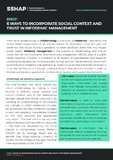SSHAP: 6 Ways to Incorporate Social Context and Trust in Infodemic Management
6 Façons D'intégrer le Contexte Social et la Confiance dans la Gestion de L'infodémie;
موج ز :
6 طرق لإدماج مراعاة السياق الاجتماعي وتعزيز الثقة في إدارة الوباء المعلومات ي

Date
2021-01-07Author
Ripoll, Santiago
Cole, Jennifer
Tulloch, Olivia
Schmidt-Sane, Megan
Hrynick, Tabitha
Metadata
Show full item recordImpact
Abstract
Information epidemiology or infodemiology is the study of infodemics - defined by the World Health Organization as an overabundance of information, some accurate and some not, that occurs during a pandemic or other significant event that may impact public health. Infodemic management is the practice of infodemiology and may sit within the risk communication and community engagement (RCCE) pillar of a public health response. However, it is relevant to all aspects of preparedness and response, including the development and evaluation of interventions. Social scientists have much to contribute to infodemic management as, while it must be data and evidence driven, it must also be built on a thorough understanding of affected communities in order to develop participatory approaches, reinforce local capacity and support local solutions. L’épidémiologie de l'information ou infodémiologie est l'étude des infodémies, définies par l’Organisation mondiale de la Santé comme une surabondance d’informations, dont certaines sont exactes et d’autres non, qui survient lors d'une pandémie ou d'un autre événement important susceptible d'avoir une incidence sur la santé publique. La gestion de l’infodémie est la pratique de l’infodémiologie et peut s’inscrire dans le pilier de la communication des risques et de l’engagement communautaire (CREC) d’une intervention en matière de santé publique. Toutefois, elle est pertinente pour l'ensemble des aspects inhérents à la préparation et à la riposte, y compris l’élaboration et l’évaluation des interventions. Les spécialistes des sciences sociales ont beaucoup à apporter à la gestion de l’infodémie car, si elle doit être fondée sur des données et des preuves, elle doit également s'appuyer sur une compréhension approfondie des communautés affectées afin de développer des approches participatives, de renforcer les capacités locales et de soutenir les solutions locales. علم الوبائيات المعلوماتية أو الوبائيات المعلوماتية هو دراسة الأوبئة المعلوماتية التي عرّفتها منظمة الصحة العالمية بأنها ذلك السيل
الجارف من المعلومات الدقيقة وغير الدقيقة في سياق الوباء أو الأحداث المهمة الأخرى التي قد تؤثر على الصحة العامة . أما إدارة الوباء
المعلوماتي فهي الجانب التطبيقي لعلم الوبائيات المعلوماتية، وربما شكلت إحدى عناصر ركيزة الإعلام بالمخاطر والمشاركة المجتمعية في
جهود الاستجابة على صعيد الصحة العامة. غير أنها تتصل بجميع جوانب التأهب والاستجابة، بما في ذلك إعداد الإجراءات التدخلية وتقييمها.
وثمة الكثير الذي يمكن أن يسهم به علماء الاجتماع في إدارة الوباء المعلوماتي، التي وإن تعين أن تكون قائمة على البيانات والأدلة، فيتعين
كذلك أن تُبنى على فهم شامل للمجتمعات المتضررة، بغية وضع نهج قائمة على المشاركة، وتعزيز القدرات المحلية، ومساندة
الحلول المحلية
Citation
Ripoll, S.; Cole, J.; Tulloch, O.; Schmidt-Sane, M. and Hrynick, T. (2021) SSHAP: 6 Ways to Incorporate Social Context and Trust in Infodemic Management, Brighton: Social Science in Humanitarian Action (SSHAP) DOI: 10.19088/SSHAP.2021.001Ripoll, S., Cole, J., Tulloch, O., Schmidt-Sane, M et Hrynick, T: « 6 façons d'intégrer le contexte social et la confiance dans la gestion de l'infodémie », Brighton : Social Science in Humanitarian Action (SSHAP) DOI : https://doi.org/10.19088/SSHAP.2021.009
الاقتباس المقترح: ريبول، س.، كول ج.، تولوك أ.، شميت–سين، م.، وهرينيك، ت.: ' 6 طرق لإدماج مراعاة السياق الاجتماعي وتعزيز الثقة في إدارة الأوبئة المعلوماتية', برايتون: منصة العلوم الاجتماعية في العمل الإنساني رمز التعريف الرقمي: DOI: 10.19088/SSHAP.2021.017
DOI
10.19088/SSHAP.2021.00110.19088/SSHAP.2021.009
10.19088/SSHAP.2021.017
Rights holder
SSHAPRights details
http://creativecommons.org/licenses/by/4.0/Sponsor
Wellcome TrustFCDO

